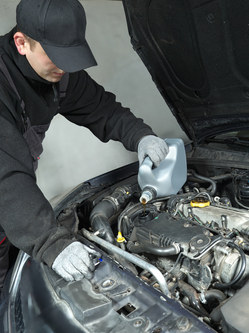
One of the advantages to buying a new car is that the manufacturer’s warranty should cover major repairs. in order to protect auto warranty rights, it is important to follow the manufacturer’s maintenance schedule.
The vehicle’s owner is responsible, for example, to change the oil in accordance with the manufacturer’s maintenance schedule. If oil is not changed frequently enough, then catastrophic engine failure could result.
It is not always necessary to change the oil every 3,000 miles; many cars require oil changes every 5,000 or 7,500 miles. However, most cars require more frequent oil changes if driven under “severe conditions.” For example, if a car is regularly driven only short distances, oil should be changed more frequently.
Owners must also periodically change the radiator coolant or antifreeze. Most manufacturers recommend that this be done every 24,000 or 36,000 miles or every two or three years. Failure to keep the radiator fluid can cause the engine to overheat, which can cause serious damage to the engine.
Auto warranties requires the manufacturer to repair any conditions caused by defects in workmanship or materials. The manufacturer is not, however, required to pay for repairs that are necessary because of a lack of maintenance.
If a serious engine problem occurs during the warranty period, the manufacturer will likely have the dealership check for signs of improper maintenace. If improper maintenance is suspected, the dealer may ask the consumer to prove the maintenance schedule was followed.
This is one reason why consumers should keep good records of the vehicle’s maintenance history. If all of the maintenance has been performed at the dealership, then the manufacturer will already have the information that it requires.
Consumers are not required to have maintenance performed at dealerships, which frequently charge more for routine service. But, consumers should take care that other shops perform proper service. For example, the owner’s manual will specify the grade of oil that a vehicle requires, and care should be taken that the right type is used in oil changes. And, consumers should make sure that they keep all of their service records.
Consumers are also permitted to perform simple maintenance themselves. We recommend that do-it-yourselfers keep a service log in which they record the date of servicing, the vehicle’s mileage, and a description of the service. They should also keep receipts for purchases of oil, filters, and other materials that used in the servicing.
Properly maintaining your vehicle can prolong its life and preserve its value. Keeping good service records can also protect a consumer’s auto warranty rights and support a higher price when it comes time to sell or trade-in the car.
